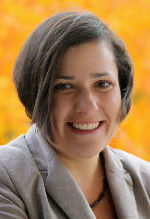Obama’s free community college plan sounds familiar to UW professor
President Barack Obama unveiled a new proposal on Thursday to provide two years of free community college tuition to students who maintain good grades.
The plan is an effort to increase the number of Americans who hold some type of post-secondary credential, and it’s a recommendation that’s very familiar to UW–Madison Professor Sara Goldrick-Rab.

Sara Goldrick-Rab
In February 2014, Goldrick-Rab spent time in Washington, D.C., sharing her thoughts with a range of stakeholders about approaches to making college affordable for all Americans. She met with the staff of U.S. Senators Tammy Baldwin of Wisconsin and Bernie Sanders of Vermont, and education advisors at the White House, to discuss President Obama’s higher education agenda.
The Obama proposal would make two years of community college free for students of any age with a C-plus average who attend school at least half-time. Obama says funding for the proposal would come via federal-state partnerships, with federal dollars covering 75 percent of the tuition and participating states being expected to fund the rest. Details on the proposal’s costs and funding are expected in Obama’s State of the Union Address on Jan. 20, and in the president’s budget request Feb. 2.
Many of the basics in the president’s proposal are consistent with the ideas of Goldrick-Rab and UW–Madison colleague Nancy Kendall, who in April co-authored a paper titled, “Redefining College Affordability: Securing America’s Future with a Free Two-Year College Option.” In it, the faculty members with the Department of Educational Policy Studies proposed making two years of community college or public four-year college free, with stipends and work-study jobs to cover living expenses. To fund their proposal, Goldrick-Rab and Kendall suggested reallocating federal funds that now support students at private and for-profit colleges.
“… we are examining whether policies like the President’s not only help students start college but also complete degrees.”
Sara Goldrick-Rab
Goldrick-Rab is a professor of educational policy studies and sociology, and is the director and founder of the Wisconsin HOPE Lab, which was launched in May and is dedicated to translational research for improving equitable outcomes in postsecondary education. The HOPE Lab, which is an acronym for Harvesting Opportunities for Postsecondary Education, is housed within UW–Madison’s School of Education.
“The Wisconsin HOPE Lab, as the nation’s only applied research institute aimed at identifying and evaluating ways to make college more affordable, plans to actively and thoroughly examine the outcomes of the president’s plan,” says Goldrick-Rab. “Our team of social scientists is currently in the field assessing the impacts of policies and practices at many levels, and in particular we are examining whether policies like the President’s not only help students start college but also complete degrees.”



